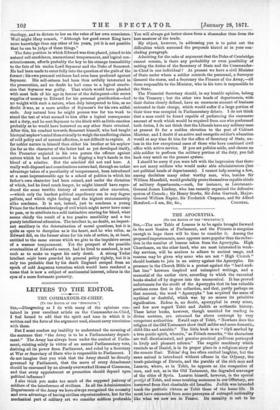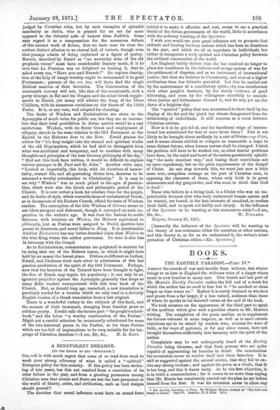THE APOCRYPHA.
[TO THE EDITOR OF THE " SPECTATOILl
SIR,—The new Table of Lessons is to be again brought forward in the next Session of Parliament, and the Primate is sanguine- enough to hope there will be time to consider it. Among the proposed improvements, none appears more popular than the reduc- tion in the number of lessons taken from the Apocrypha. High Churchmen, on the other hand, who are most interested in week- day services, will be anxious to adhere to ancient usage, and reasons may be given why some who are not "High Church" should hesitate to join in an outcry against the Apocrypha. Its- presence in the Church Bible is a protest against the "hard-and- fast line" between inspired and uninspired writings, and a memorial of the earlier view, according to which the canonical books shaded off by degrees into the uncanonical. It has proved unfortunate for the credit of the Apocrypha that its less valuable portions come first in the collection, and that, partly perhaps on that account, the word " Apocrypha " has acquired the sense of mythical or doubtful, which was by no means its primitive signification. Esdras is, no doubt, apocryphal in every sense, and few now regard Tobit and Judith as authentic history. These latter books, however, though uusuited for reading in divine services, are esteemed far above contempt by very competent authorities. Ewald says of Tobit, "Nowhere does the- religion of the Old Testament show itself milder and more domestic, child-like and amiable." The little book is an "idyll marked by a true poetic spirit, wherein," as Fritsch remarks, "the characters are well discriminated, and genuine practical godliness portrayed in lively and pleasant colours." The angelic machinery which reminds us of Daniel, is in its proper place in a religious story of the remote East. Tobias' dog has often excited laughter, but the same animal is introduced without offence in the Odyssey, the tomb-paintings of Etruria, and the parable of the rich man and Lazarus, where, as in Tobit, he appears as the companion of man, and not, as in the Old Testament, the degraded scavenger of the cities of Syria. Lazarus himself, however, is the special protégé of Tobit, and some touching sentences in our Offertory, are borrowed from that charitable old Israelite. Judith was intended teach the patriotic virtues as Tobit those of the home life. It must have emanated from some paroxysm of outraged nationality like what we now see in France. Its morality is not to be-
judged by Christian rules, but by such examples of splendid mendacity as Joel's, who is praised for an act far more opposed to the Oriental code of honour than Judith's. Some may regard it as a compensation for the numerous defects of this ancient work of fiction, that we have near its close the earliest distinct allusion to an eternal hell of torture, though even that passage admits of being explained as a figure of poetry. Baruch, described by Ewald as "no unworthy echo of the old prophetic voices" must have considerable literary merit, if it be true that La Fontaine was so delighted on hearing it, that he asked every one, "Have you read Baruch ?" Its copious descrip- tion of the folly of image worship ought to recommend it to good Rrotestants ; patrons of the cat, too, will there find the single Biblical mention of their favourite. The Convocation of the =nineteenth century will not, like that of the seventeenth, seek a party triumph in Bel and the Dragon and the other Greek supple- ments to Daniel, yet many still admire the Song of the Three 'Children, with its numerous variations on the theme of the 148th -Psalm. It is, at any rate, well adapted for chanting.
The books of Wisdom and Ecclesiasticus are alone in the Apocrypha of much value for public use, but they are so instruc- tive that their total prohibition in divine service would be a real -misfortune. Wisdom, with its fluent Greek and employment of allegory, stands in the same relation to the Old Testament as the Epistle to the Hebrews does to the New. Ewald praises the -author for "his deep insight into the eternal and spiritual truths of the old Dispensation, which he had skill to distinguish from what was accidental and temporary, and to combine with many thoughts and principles of the best Grecian philosophy of his day." 4' Had not this book been written, it would be difficult to explain -various passages in St. Paul and St. John." Another critic says, -61 Looked at impartially, this book, with its doctrines of immor- tality, eternal life, and all-pervading divine love, deserves to be esteemed a worthy antechamber to Christianity." It is easy to see why" Wisdom" was so much prized in the ages of persecu- tion, which were also the Greek and philosophic period of the 'Church. It is now rather a book for scholars than for the people, and its faults of style, which resemble those of ecclesiastical Greek, as in documents of the Eastern Church, offend the taste of Western readers. The assumption of the title Wisdom of Solomon seems to our ideas arrogant and dishonest, though it conveyed no such im- pression in the author's age. It was then the fashion to credit 'Solomon with treatises on Wisdom, the Hebrew equivalent to philosophy, just as Psalms were assigned to David, sportive love poems to Anacreon, and moral fables to lEaop. It is questionable whether Ecclesiastes has any better-founded claim than Wisdom to the wise King whom the author personates. Its tone is also less in harmony with the Gospel.
As to Ecclesiasticus, commentators are perplexed to account for its being shut out of the Hebrew canon, in which it might have held by no means the lowest place. Divines so different as Luther, Ewald, and Chalmers rival each other in admiration of this last genuine production of the spirit of the Old Testament. Perhaps, -now that the beauties of the Talmud have been brought to light, the Son of Sirach may regain his popularity ; it can only be an ignorant prejudice against the Apocrypha generally that keeps so many Bible readers unacquainted with this true book of the Church. But, as Arnold long ago remarked, a new translation is peculiarly needed for a treatise which we only read in a slovenly .English version of a Greek translation from a lost original.
There is a wonderful variety in the subjects of this book, and the manner of their treatment, changing from familiar prose to -sublime poetry. Ewald calls the former part "the people's school- 'book," and the latter "a worthy continuation of the Psalms." Might not a careful selection be occasionally substituted for some -of the late historical pieces in the Psalter, or for those Psalms which are too full of imprecations to be very suitable for the lan- guage of Christian devotion ?—I am, Sir, &c., N. G. BATE



































 Previous page
Previous page